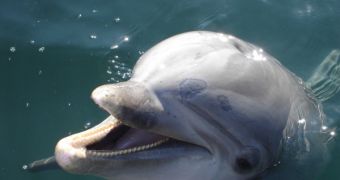Representatives of the National Oceanic and Atmospheric Administration (NOAA) say that an intervention to rescue the 9 bottlenosed dolphins currently swimming in the Shrewsbury and Navesink rivers is not advisable at this time, as the animals are not in any immediate danger. The stance angers environmental groups, which say that action must be taken immediately to ensure that the 1993 incidents, when four dolphins were eventually surrounded by river ice and drowned, do not happen again.
"We are not seeking help to mount an intervention and would not authorize others to mount such an attempt at this time," NOAA spokesperson Teri Frady says in an official e-mail. The federal agency says that the dolphins have already been in the rivers for the better part of six months, and that a rescue attempt is not needed at this time.
"I have no doubt that we could do this successfully. We want to help, and we know how to help," argues Marine Mammal Conservancy president Robert Lingenfelser, who says that his organization has had a 63 percent success rate in managing to rescue stranded marine mammals in the past. He adds that representatives from other eco-friendly groups have also agreed to assist, and that there are approximately 30 volunteers ready to act at a moment's notice.
The co-director of New Jersey's Marine Mammal Stranding Center in Brigantine, Bob Schoelkopf, says that Lingenfelser's offer to assist is very generous and adds that "They are very good. They know what they're doing with these animals. It's better than just leaving them alone to freeze to death."
The concern that environmental groups have with these dolphins is well-founded, sea life experts say. As winter sets in, ice can clog the river, trapping the dolphins underneath and suffocating them. In June, when the animals were first spotted in the two rivers, water temperatures were as high as 60 degrees F. Currently, they are lower than 35F, and will continue to decrease until the rivers freeze.

 14 DAY TRIAL //
14 DAY TRIAL //